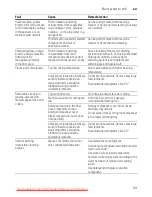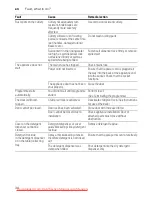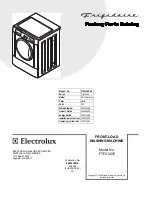
en
Fault, what to do?
34
Rust spots on the cutlery.
Cutlery not adequately rust-
resistant. Knife blades are
frequently more severely
affected.
Use corrosion-resistant cutlery.
Cutlery will also rust if rusting
parts are rinsed at the same time
(pan handles, damaged utensil
baskets, etc.).
Do not wash rusting parts.
Salt content in the rinsing water
too high, as salt dispenser lock
not fastened firmly or salt was
spilled while being refilled.
Fasten salt dispenser lock firmly or remove
spilled salt.
The appliance does not
start.
The mains fuse has tripped.
Check mains fuse.
Power cord not inserted.
Ensure that the power cord is plugged all
the way into the back of the appliance and
into the socket. Check that the socket
functions.
The appliance door has not been
shut properly.
Close the door.
Programme starts
automatically.
You did not wait until programme
ended.
Perform reset.
(See Terminating the programme).
The door is difficult
to open.
Child-proof lock is activated.
Deactivate childproof lock. (See instructions
for use at the back)
Door cannot be closed.
Door lock has been activated.
Close door with increased force.
Door cannot be closed due to
installation.
Check appliance installation: Door or
attached parts must close without
obstruction.
Cover on the detergent
dispenser cannot be
closed.
Detergent dispenser or cover
guide blocked by sticky detergent
residue.
Remove detergent residue.
Detergent residue
in the detergent dispenser
or in the tablet collecting
tray.
Spray arms blocked by utensils,
therefore detergent is not rinsed
out.
Ensure that the spray arms can rotate freely.
The detergent dispenser was
damp when filled.
Pour detergent into the dry detergent
dispenser only.
Fault
Cause
Remedial action
Downloaded from DishWasher-Manual.com Manuals









































